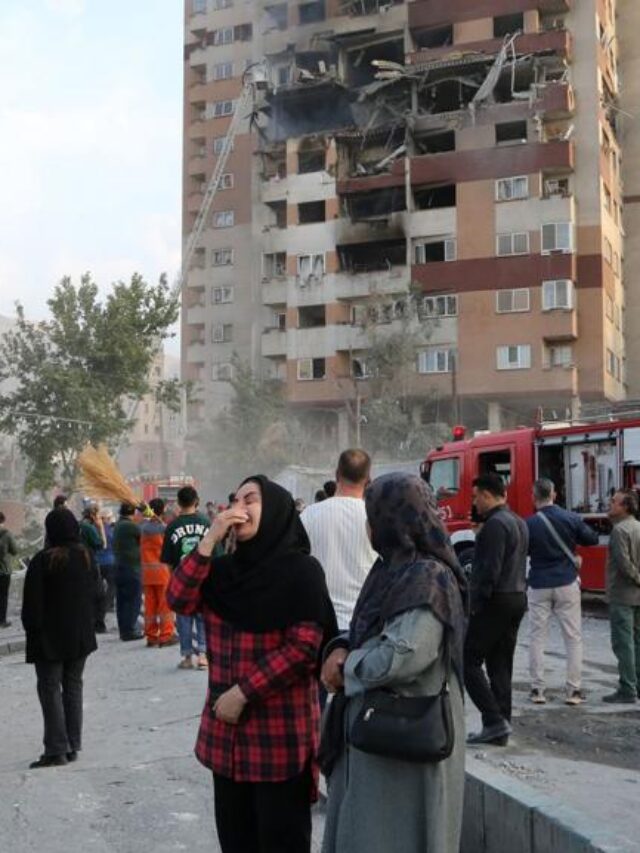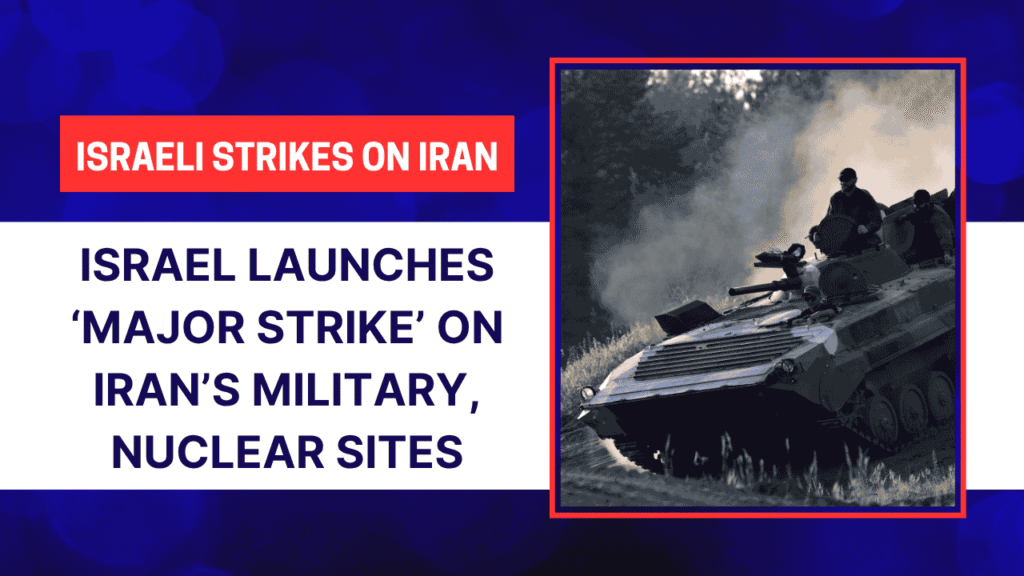Overnight Exchange of Fire Between Israel and Iran; Blasts Rock Jerusalem and Tel Aviv.
Table of Contents

On June 13–14, 2025, Israel and Iran engaged in a night of intense military exchanges, marking a significant escalation in their long-standing conflict. Israel launched large-scale air strikes targeting Iranian nuclear facilities and missile bases, prompting Iran to retaliate with ballistic missile and drone attacks on Israeli cities, including Jerusalem and Tel Aviv. The violence has resulted in significant casualties, infrastructure damage, and heightened regional tensions, with global leaders urging restraint and diplomacy. This blog provides a detailed account of the events, the human toll, and the international response, including India’s potential role in mediation.
Israel-Iran Conflict : Timeline of Events
- June 13, 2025: Israel initiated a series of air strikes on Iranian nuclear facilities, including the Natanz uranium enrichment site and the Isfahan Nuclear Technology Center, as well as missile bases and airfields in Hamadan and Tabriz. The Israeli Defense Forces (IDF) reported killing six Iranian nuclear scientists and several high-ranking military commanders, including Major General Mohammad Bagheri (Chief of Staff), Hossein Salami (IRGC Commander), and Gholam Ali Rashid (IRGC Khatam-al Anbiya Headquarters). Iran’s UN envoy reported 78 deaths, including civilians, and over 320 injuries.
- June 14, 2025: Iran retaliated with multiple waves of ballistic missiles and drones targeting Israel. The IDF reported intercepting many of the over 100 drones and missiles, but some struck Tel Aviv and surrounding areas, killing at least three people and injuring dozens. Explosions were heard in Jerusalem, Tel Aviv, and the occupied West Bank, with air raid sirens forcing millions into bomb shelters. A high-rise building in central Tel Aviv and an apartment block in Ramat Gan were damaged, and a missile struck near the heart of Tel Aviv.
Israel-Iran Conflict : Casualties and Damage

- Israel: At least three fatalities were reported: one woman in her 60s and a man in his 40s killed in central Israel, and another woman who died from injuries sustained in a Tel Aviv suburb. Israel’s Magen David Adom reported 34–40 injuries, including two in critical condition and others with mild to moderate injuries. Damage included a high-rise residential building in Tel Aviv, an apartment block in Ramat Gan, and a brush fire in northern Israel caused by missile fragments.
- Iran: Iran’s UN envoy reported 78 deaths, including senior military officials and civilians, with over 320 injured, mostly civilians. Strikes hit Tehran’s Mehrabad Airport (housing an air force base), causing explosions and fires, and the Natanz nuclear facility’s above-ground enrichment plant was destroyed. Explosions were also reported in Tehran’s Hakimiyeh and Tehranpars neighborhoods.
- Regional Impact: A Houthi missile from Yemen landed in a Palestinian town in the West Bank, and Iranian drones were intercepted over Judea and the Dead Sea. Israel’s Ben Gurion Airport remains closed, disrupting air travel.
Israel-Iran Conflict : Military Actions
- Israel’s Offensive: The IDF conducted continuous air strikes on Iranian targets, focusing on nuclear facilities, ballistic missile factories, and air defenses. Prime Minister Benjamin Netanyahu stated the operation aimed to “damage Iran’s nuclear infrastructure and military capabilities” and was “just the beginning” of efforts to prevent Iran from developing nuclear weapons. The IDF also reported intercepting Iranian drones and missiles using the Arrow missile defense system, supported by US forces.
- Iran’s Retaliation: Iran’s Islamic Revolutionary Guard Corps (IRGC) launched over 100 ballistic missiles and drones, targeting Israeli military and economic infrastructure. Supreme Leader Ayatollah Ali Khamenei vowed a “harsh response,” and Iran appointed Habibollah Sayyari as the new armed forces chief and Ahmad Vahidi as IRGC commander following the deaths of senior leaders. Iran’s UN envoy, Amir Saeid Iravani, called the strikes a response to Israel’s “barbaric attacks” on civilian and nuclear sites.
Israel-Iran Conflict : International Response
- UN Secretary-General António Guterres: Guterres condemned the escalation, stating, “Israeli bombardment of Iranian nuclear sites. Iranian missile strikes in Tel Aviv. Enough escalation. Time to stop. Peace and diplomacy must prevail.” He expressed concern over attacks on nuclear facilities and urged maximum restraint to avoid a broader conflict.
- United States: The US assisted Israel in intercepting Iranian missiles but denied direct involvement in Israel’s strikes. President Donald Trump urged Iran to negotiate on its nuclear program, warning of “more brutal” Israeli attacks if talks fail. The US emphasized a defensive role, with Pentagon officials confirming no US personnel were injured.
- European Leaders: EU Commission President Ursula von der Leyen and French President Emmanuel Macron called for de-escalation, with von der Leyen affirming Israel’s right to self-defense while urging restraint. NATO Secretary-General Mark Rutte described Israel’s actions as unilateral but maintained the region was not close to nuclear conflict.
- Russia and China: Russian President Vladimir Putin offered to mediate, condemning Israel’s attacks and urging diplomacy. China’s UN Ambassador Fu Cong condemned Israel’s violations of Iran’s sovereignty and called for an immediate halt to risky military actions.
- India’s Potential Role: Israel’s Ambassador to India, Reuven Azar, highlighted India’s potential to mediate due to its diplomatic ties with both nations. Following a conversation between Prime Minister Narendra Modi and Israeli Prime Minister Benjamin Netanyahu, Azar noted, “India has avenues for dialogue with both sides… We listen carefully to your concerns.” India’s External Affairs Minister S Jaishankar previously emphasized avoiding escalation in West Asia.
Regional and Global Implications
The strikes have raised fears of a wider regional conflict, particularly given the targeting of Iran’s nuclear facilities, which the International Atomic Energy Agency (IAEA) insists “must never be attacked.” Iran’s weakened regional proxies, including Hezbollah and Hamas, limit its retaliatory options, but the destruction of key military and nuclear infrastructure has heightened domestic unrest in Iran. The closure of Israel’s airspace and disruptions at Tehran’s Mehrabad Airport underscore the immediate economic and logistical impacts. Crude oil prices surged due to fears of further escalation in the oil-producing region, though OPEC reported no immediate changes to supply.
The June 2025 Israel-Iran conflict represents a dangerous escalation, with both nations exchanging devastating strikes that have killed dozens and injured hundreds. The targeting of nuclear facilities and civilian areas has drawn global condemnation and urgent calls for de-escalation from leaders like UN Secretary-General António Guterres. India’s potential role as a mediator offers a glimmer of hope for diplomatic resolution, but the region remains on edge. As investigations continue and both sides prepare for further action, the international community watches closely, urging peace to prevent a broader Middle East conflict. Our thoughts are with the victims and their families.
Disclaimer: This article is based on information from various news sources and publicly available data. The accuracy of the information cannot be guaranteed, as investigations are ongoing. Readers are advised to refer to reliable sources for further details.
Sources: BBC News, Reuters, The Times of Israel, India Today, BBC
